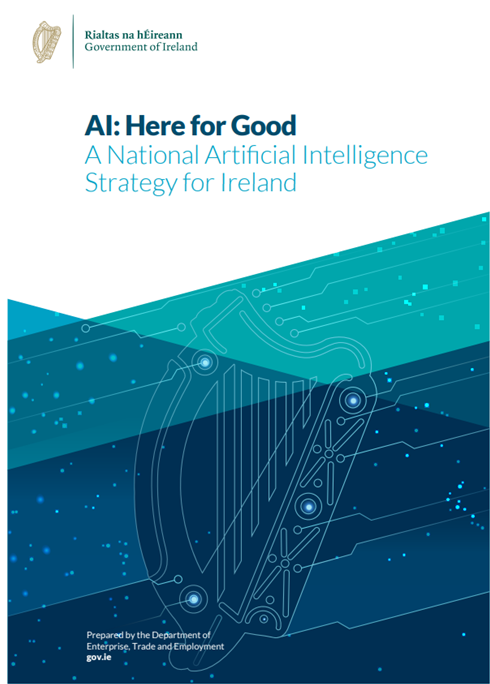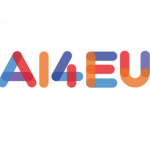
ΑΙhub.org
“AI: Here for Good” – Ireland releases national AI strategy

By Long Pham
The Government of Ireland released its national AI strategy on Thursday 8th July 2021, presenting it online, with key members of the government and the public sector in attendance.
Comprising a 73-page document, the strategy considers AI from three different perspectives: building public trust in AI, leveraging AI for economic and societal benefit, and enablers for AI. These key aspects are detailed in the strategy document, with eight actionable corresponding strands ranging from how to engage and raise awareness of the public about AI, to building a strong AI innovation ecosystem, to nurturing and developing AI skills and talents.
Following the European approaches of ethical, human-centred, and trustworthy AI, “The National AI Strategy will serve as a roadmap to an ethical, trustworthy and human-centric design, development, deployment and governance of AI to ensure Ireland can unleash the potential that AI can provide,” writes Robert Troy, Minister of State for Trade Promotion, Digital and Company Regulation.
“Underpinning our Strategy are three core principles to best embrace the opportunities of AI – adopting a human-centric approach to the application of AI; staying open and adaptable to innovations; and ensuring good governance to build trust and confidence for innovation to flourish, because ultimately if AI is to be truly inclusive and have a positive impact on all of us, we need to be clear on its role in our society and ensure that trust is the ultimate marker of success.”

The eight different strands considered as part of the three key perspectives are as follows:
- Building public trust in AI
- Strand 1: AI and society
- Strand 2: A governance ecosystem that promotes trustworthy AI
- Leveraging AI for economic and societal benefit
- Strand 3: Driving adoption of AI in Irish enterprise
- Strand 4: AI serving the public
- Enablers for AI
- Strand 5: A strong AI innovation ecosystem
- Strand 6: AI education, skills and talent
- Strand 7: A supportive and secure infrastructure for AI
- Strand 8: Implementing the Strategy
Each of the strands has clear objectives and associated actions to be carried out by governmental departments, ministries, and public organisations.
The AI4EU connection
University College Cork (UCC), who’s AI division is led by Barry O’Sullivan (AI4EU Executive Board member), was one of the named contributors in several key areas of the strategy.
UCC collaborated with the University of Helsinki and Reaktor, a Finnish technology company, to bring the “Elements of AI”, a free online course, to the public. This course aims to encourage everyone, regardless of age or educational background, to learn the basics of AI. An Irish language version has been created and will be formally launched in 2021.
UCC also host, on behalf of the European Commission, the web-based version of the Assessment List for Trustworthy AI (ALTAI), a checklist of questions for businesses and organisations to assess whether the AI system that is being developed, deployed, or procured, adheres to the seven requirements of Trustworthy AI, as specified in the EU AI high-level expert group ethics guidelines.
The tool, available here, supports all users wishing to assess their AI systems and products before and during their various development stages. The EU guidelines’ seven requirements are: human agency and oversight; technical robustness and safety; privacy and data governance; transparency; diversity, non-discrimination, and fairness; environmental and societal well-being; and accountability.
“At UCC, we’re ready to deliver on the expectations set out for us by Government in Ireland’s National AI Strategy to support the responsible and ethical use and governance of all AI developed for and used by the public service in Ireland,” said Barry O’Sullivan.
UCC is also home to the Science Foundation Ireland (SFI) Centre for Research Training in Artificial Intelligence (CRT-AI) which has funding to support 120 PhD students to study AI. The CRT-AI is one of six such centres. The SFI CRTs represent a €104 million investment from Science Foundation Ireland. Collaborations include eleven different higher education institutions from across Ireland, and over 90 industry partners which include large, multinational corporations, SMEs and private foundations.
Ireland’s National AI Strategy encourages universities, technology institutes and colleges to take a coordinated approach to deliver AI education and training programmes while employers will be assisted to expand workplace-focused AI upskilling and reskilling, including through apprenticeships, Skillnet Ireland training programmes and enterprise partnership schemes.
On infrastructures that support the National AI Strategy, the Irish government also outlined its plans to create world-class data, digital and connectivity infrastructures for driving AI development and adoption in Ireland. The Government also intends to make more public sector data openly, safely, and securely available and will facilitate the development of trusted data sharing mechanisms and research environments to enable access to data and collaboration across different organisations.
Read the strategy document in full.









